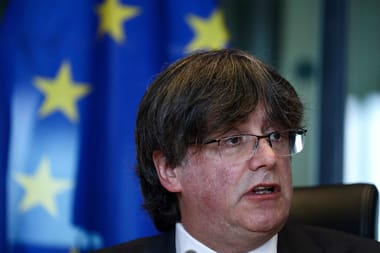
Press play to listen to this article
Voiced by Amazon Polly
The EU’s parliamentary chamber can be a cold place. Very few of its members gain fame — or even a glimpse of recognition — outside its walls, and those who do catch the spotlight don’t always owe it to their merits as legislators. Sometimes it’s thanks to their quirks and oddities.
To dig into the performance of this European Parliament, we extracted data on attendance, voting records and interactions with other institutions between July 2, 2019 and December 20, 2021 and combed other publicly available information using the POLITICO Pro platform, which gathers data from the EU institutions and other sources.
We analyzed the findings to answer questions including: Who were the biggest rebels in defecting from their party line? Which MEPs had the worst attendance record? Who filed the most amendments, made most noise online or made the most money from outside jobs?
Here’s a rundown of the individual MEPs who stood out.

Top dissident
Dorien Rookmaker
With only half of her votes matching those cast by the majority of her European Conservatives and Reformists (ECR) group, Dorien Rookmaker is the MEP who most often dissented from her political movement.
Rookmaker clearly has trouble finding a party and sticking with it. The Dutch former banker ran for office in her home country with the left-leaning and liberal D66 years ago but won a seat in the Dutch parliament with the right-wing Forum for Democracy in 2019. Soon after, she quit that party due to an internal split. She then got a lucky break, landing one of the European Parliament’s “Brexit seats” in February 2020 when the chamber was reshaped by the departure of the United Kingdom. She entered Parliament as an independent, joining the European Conservatives and Reformists only in early December 2021. But if her voting record is any indication, she’s an uncomfortable fit.
Stats: Rookmaker dissented from the ECR’s main group vote 48.3 percent of the time.
What she says: “Group discipline is a bad thing, caused by career politicians who are afraid of damaging their prospects later in life,” Rookmaker said in response to our analysis, adding that “voting differently from the group is no objective in itself, but it can be necessary to stay true to myself.”

Biggest loser
Mislav Kolakušić
Either he’s got a talent for picking the wrong side, or he’s being consistently boxed out.
Croatian former judge Mislav Kolakušić is a self-described “non-affiliated activist for the rule of law and fighter against corruption.” As an independent MEP, he lacks the infrastructure of political groups in the chamber, but it’s his voting record above anything else that feels lonely: He voted with the winning side in only 14.8 percent of votes — the lowest of all members.
Runners-up: The top four losers are dominated by independent MEPs, including two Croatians and two Greeks. In fifth place is Dutch right-winger Marcel de Graaff of the Identity and Democracy Group (ID). De Graaff is a long-serving member of the Party of Freedom founded by Geert Wilders, the Dutch populist who turned anti-EU sentiment into a party strategy.

Most absent
Silvio Berlusconi
Italy’s 85-year-old media tycoon-turned-prime minister Silvio Berlusconi is on the last leg of his career (we think) in the Parliament. But since taking up his mandate in 2019, Berlusconi has missed plenty of votes: His roll-call attendance is below 59 percent — the lowest of all members of the chamber.
The reason for the Italian MEP’s absence is likely his fight with COVID-19. Berlusconi got infected with the virus in September 2020 and struggled with its symptoms for months. Berlusconi’s office did not respond to requests for comment.
The stats: Berlusconi missed almost 1,700 votes, putting him hundreds of votes behind other MEPs. On the flip side, the analysis reveals that only seven MEPs out of the full 705 recorded a voting record below 80 percent.
Just a job: The list of MEPs who missed the most voting sessions is a snapshot of the impact of sick leave and other registered absences on voting patterns. Alongside Berlusconi, other MEPs who said they missed out on voting due to medical leave include Poland’s Janina Ochojska and Róża Thun und Hohenstein, and Germany’s Helmut Geuking. Swedish MEPs Sara Skyttedal and Arba Kokalari were both on maternity leave during 2021.
A more unusual reason: MEP Ioannis Lagos, who ranked seventh on the list of absentees, has been imprisoned in Greece since April 2021 for running a criminal organization as co-founder of the ultranationalist Golden Dawn party, after the European Parliament overwhelmingly voted to lift his immunity. “My imprisonment was for this very purpose: so that I will not be able to execute my mandate in the European Parliament,” he said.

Noisiest
Emmanouíl Fragkos
Greek Conservative MEP Emmanouíl Fragkos topped the charts in using his office’s powers to probe the Commission, Council of the EU and other institutions with “written questions.”
MEPs rely on such questions to oversee the EU’s work. The 28-year-old Fragkos is a big fan of the instrument, filing questions on everything from wildlife protection to Middle Eastern security policy. Since July 2019, he has filed a question on average every five to six days.

Most ignored
Andor Deli
There’s no love lost between the European Commission and Hungarian ruling party Fidesz, and perhaps that’s showing in the data. Of all MEPs who asked at least 20 questions to other EU institutions, Hungary’s Andor Deli — a Fidesz member — had the longest average waiting time for a response.
The stats: Deli asked 24 questions and waited on average 111 days for an answer.
His response: “The fact that the Commission rarely manages to provide an answer . . . within the time limits provided in the rules of procedure [as a general rule within six weeks, or 42 days] is worrying in general,” Deli said. “Additionally, the quality of the provided answers are not satisfying either.”
Notable mention: For MEPs who asked fewer than 10 questions, it’s British Conservative Annunziata Mary Rees-Mogg — younger sister of Jacob, the leader of the British House of Commons — who topped the charts: She asked two questions related to EU funding for the East Midlands in 2019. The Commission took 139 days to answer, meaning the responses arrived after the U.K. had departed the EU and Rees-Mogg had left her post as an MEP.

Lone wolf
Isabel García Muñoz
Isabel García Muñoz of the Spanish Socialist Workers’ Party most often filed amendments to legal texts by herself. She sets herself apart from many other MEPs who prefer signing onto amendments or gathering support from others ahead of tabling their own.
Stats: García Muñoz authored 1,718 amendments on her own.
Quicker alone: García Muñoz said she cared more about “the quality of [amendments] and to the improvements I can bring to the legislative text,” adding she often filed them alone “because of tight deadlines that don’t allow consulting with colleagues in time.”

Peak FOMO
Gilles Boyer
If you need someone to sign onto your amendment, your best chance is to call French liberal Gilles Boyer.
In the past two and a half years, Boyer co-signed more than 3,000 amendments with other MEPs. That puts him hundreds of amendments ahead of any other MEP except for Lithuanian liberal Petras Auštrevičius, who is not far behind, having co-signed 2,813.
What he says: “I’m certainly not looking for quantity, just quality and coherence,” Boyer said, adding that “obviously, I study amendments when considering co-signing.” That’s a relief.

Bridge-builder
Esther de Lange
These days, democratic politics can sometimes feel like a shouting match between opposing sides, but many MEPs are still trying to work across the aisle. Dutch Christian Democrat Esther de Lange, of the European People’s Party (EPP), is the clearest example of that.
De Lange filed 814 amendments with members of other European Parliament groups, more than any of her peers.

Chattiest in the chamber
Joachim Brudziński
If the political filibuster ever becomes a thing in Europe, the Conservatives and Reformists group (ECR) has an ace up its sleeve with Polish Law and Justice member Joachim Stanisław Brudziński.
Stats: Brudziński, a former minister of interior, is the only MEP to have spoken more than 10,000 words during plenary debates, according to transcripts of the minutes.
Making a point: “Working in the European Parliament is a matter of conversation, debate, presenting arguments. I try to take this work seriously, that is why I try to use substantive arguments,” Brudziński said.

Chattiest online
Hermann Tertsch
Either Hermann Tertsch never sleeps, or he has a team of — potentially automated — assistants manning his Twitter feed. Tertsch’s account is vastly more active than that of any other MEP. The Spanish MEP from the far-right Vox party has tweeted (and retweeted) more than 116,000 times since July 2019. That’s more than three times as much as the runner-up in this list, Spanish socialist Ibán García del Blanco.
Stats: Tertsch has tweeted or retweeted on average more than 120 times per day since July 2, 2019. He has over 280,000 followers on the social media platform and isn’t shy about retweeting himself.

Wildest dropout
József Szájer
Ninety-nine members of the European Parliament have dropped out since taking their seats at the beginning of this term. Seventy-four of those were Brits, who left because of Brexit. Of the 25 non-British dropouts, Hungary’s József Szájer is the one who went out with the biggest bang.
Szájer was a close confidant of Viktor Orbán and co-founder of the Hungarian prime minister’s Fidesz party. He fell from grace in December 2020 after he was outed for having attended a lockdown-busting party with naked men and drugs in Brussels. Orbán called the deed “unacceptable and indefensible” and Szájer quit the party and his post in Brussels. A political comeback is — we believe — unlikely.
Among the other dropouts: The Greens’ powerhouse Sven Giegold stepped down mid-December to take up a role as state secretary in Germany’s Federal Ministry for Economic Affairs and Climate Action. Belgian Christian Democrat Kris Peeters quit in November to take up a job as vice president of the European Investment Bank.
The prize for the shortest tenure goes to Greek telemarketing man-turned-politician Kyriakos Velopoulos, who served just four days this term. Velopoulos now sits in the national parliament, where his fledgling party Greek Solution (Elliniki Lysi) has replaced Golden Dawn as the far-right bad boy of Hellenic politics.

Biggest hustler
Guy Verhofstadt
The EU’s most well-known federalist has a knack for the side hustle. Guy Verhofstadt makes more from outside earnings than any other MEP — a distinction he’s held for many years. The Belgian Liberal and former prime minister has six outside gigs, pulling in between €13,500 and €26,000 every month, according to financial declarations given by all MEPs at the start of their term and aggregated by Transparency International.
Reasoning: A staff member of Verhofstadt said the MEP “makes sure there is no clash of interests … and his voting behavior is unaffected,” adding that “he has a higher profile than most” other MEPs, arguing this leads to more speaking engagements.
Data extraction by Dhanashri Dehadraya and Karl Bjelland.




